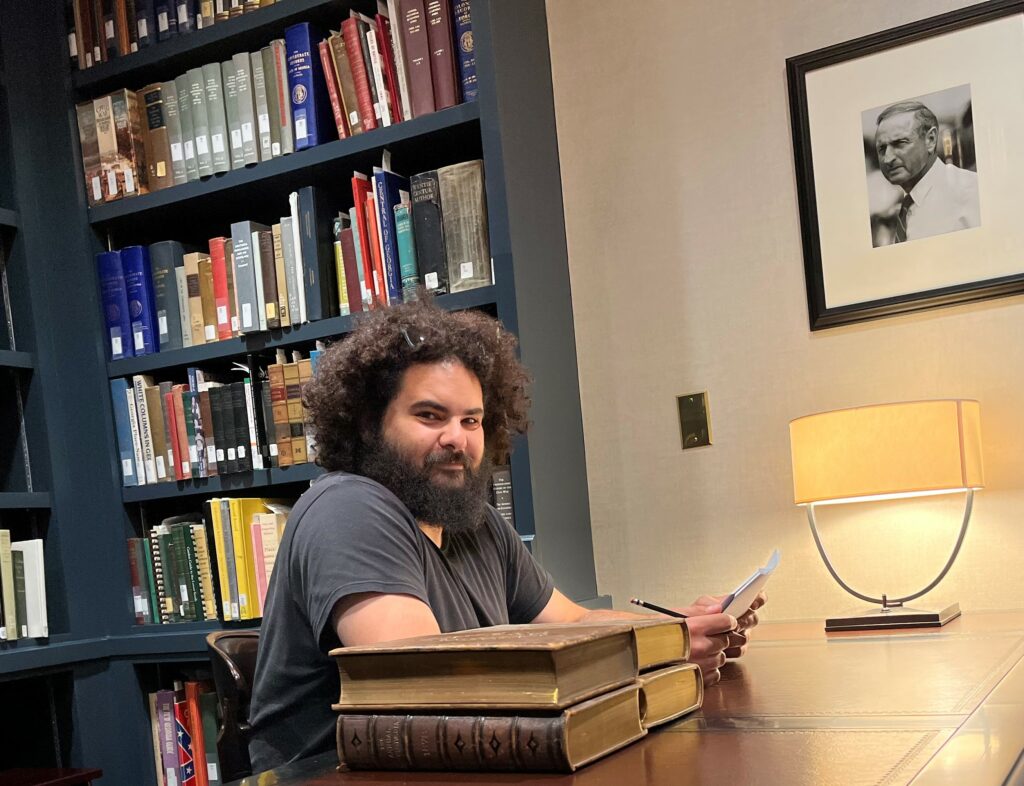The Georgia Historical Society welcomed the inaugural class of Dooley Distinguished Research Fellows to the GHS Research Center in May. The Research Fellows Program, part of the larger Vincent J. Dooley Distinguished Fellows Program, honors Vince Dooley for his lifelong commitment to history and higher education.
The Research Fellows Program is designed to mentor the next generation of historians by giving younger scholars the opportunity to conduct research for a specific period of time in the vast collection of primary sources at the Georgia Historical Society Research Center. The research is expected to lead to a major piece of scholarly work, such as a dissertation, a book, an article in a refereed scholarly journal, a chapter in an edited collection, or an academic paper presented at a scholarly conference. Click here to learn more about the Dooley Fellows program.
For the past several weeks Off the Deaton Path has been introducing our readers to the 2022 Dooley Research Fellows to learn about their work, their research at GHS, and the experience of being a Dooley Distinguished Fellow. This week we’ll meet the third of our Fellows, Lewis Eliot, an assistant professor of History at the University of Oklahoma.

Tell us about yourself: I was born and raised in Brixton in southwest London by a mixed-race single mother from South Africa. Brixton has a large West Indian population and between that and my family over in Cape Town I became fascinated by the intersection of race and nationality. This interest was the centerpiece of my university education, first as an undergraduate at the School of Oriental and African Studies where I researched about the academic origins of apartheid in South African universities and then at Queen’s University, Belfast, where I completed an MA on the role of race in dictating the locations of large municipal projects (in particular sports stadiums). In 2014 I found my way to the University of South Carolina to enroll in its PhD program. My dissertation was about the evolution of British anti-slavery as an imperial ideology during the nineteenth century. I graduated in 2021. I am currently a tenure-track assistant professor at the University of Oklahoma, where I teach courses on Britain and the British Empire.
What interested you in the Dooley Distinguished Fellowship? What has your experience been like here at GHS? Like everyone else, it’s been a fair while since I’ve been able to get into the archives. My most recent research trips (now over two years ago…!) were to the British National Archives and Oxford University’s Bodleian Library. Both are highly efficient and stuffed with incredible sources, but also quite anonymous. The GHS has a great mix of that same efficiency and yet is small enough for researchers to get to know the staff and talk about what they’re finding. It’s also an incredible space to get some work done.
Tell us about your current project: I’m currently working on three separate projects. I am in the process of completing my first monograph, Neither Men nor Brothers: Enslaved Rebellion, Abolitionism, and Imperialism in Britain’s Nineteenth-Century Atlantic World, which examines the role of people of African descent in informing the development and progress of anti-slavery ideologies in the 1800s. I also have two articles in the works. One is on the anti-transatlantic slave trade patrols of the West Africa Squadron and in particular the conflict that ship captains faced between their personal prejudices and progressive mission. The other is about the view of slavery from the metropole, using William Clark’s bucolic prints of Antiguan plantations to demonstrate the challenges abolitionists faced in convincing the British public of the horrors of West Indian slavery.
What are you finding at GHS? The collections here in Savannah are very impressive and I managed to identify pieces that will make their way into several projects. The Keith M. Read Collection (MS 0648) has some excellent letters back and forth between Read and the British Consulate in Savannah during the Civil War, and the Papers of John McIntosh Kell and his wife Julia Blanche Munroe Kell (MS 0456) have given me some great insights into life in the US and Confederate Navies. But I think my favorite find has been William P. Brooks’s Civil War Scrapbooks (MS 0969). Brooks was a CSA naval engineer and after the war joined the Spanish Imperial Navy. Though it is quite sparse, I am excited about finding a way to bring his story and what it means for the nature of imperialism in the 1860s Atlantic world to paper.
